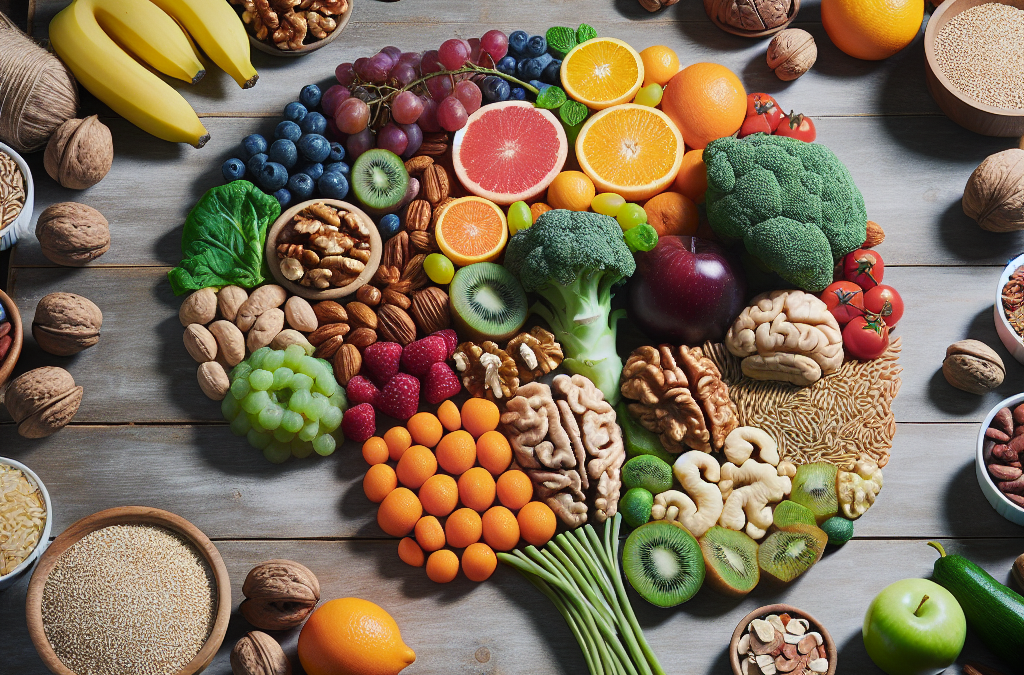Understanding Whole Foods
What are Whole Foods?
Whole foods are basically foods that are as close to their natural state as possible. Think fruits, veggies, whole grains, nuts, and seeds. Nothing overly processed or packed with a bunch of weird ingredients that you can’t pronounce. Every time I chop into an apple or toss some quinoa into my lunch, I feel like I’m doing something good for my body.
They bring the nutrients straight to us without all the added junk. I mean, who knew that eating colorful foods not only tastes good but also packs a punch when it comes to health benefits? It’s like nature’s candy and medicine rolled into one!
Plus, the benefits don’t just stop at physical health. Whole foods can boost your mood and enhance your mental clarity, making you feel more alive, and that’s essential in the fight against Alzheimer’s.
The Connection Between Diet and Alzheimer’s Disease
How Diet Affects Brain Health
In my journey into nutrition, I’ve found that what we eat has a direct impact on brain health. It’s not just about avoiding bad habits; it’s also about embracing good ones. Healthy fats, antioxidants, and vitamins play significant roles in maintaining cognitive functions.
Research suggests that diets rich in antioxidants can help protect brain cells. I like to think about it as wrapping my neurons in protective armor! The more I learn and implement these ideas in my life, the more I appreciate the science behind these foods.
Moreover, poor diet choices can lead to inflammation, which is a big enemy of brain health. I’ve learned that by simply incorporating more whole foods into my daily meals, I’m actively working to keep my brain sharp.
Key Whole Foods to Incorporate
Fruits and Vegetables
Okay, let’s talk specifics! Fruits and vegetables are the MVPs when it comes to fighting Alzheimer’s. I can’t stress enough how important it is to throw a rainbow of veggies on your plate. You’ve got your leafy greens, colorful bell peppers, and antioxidant-rich berries. Each of them has unique benefits!
Like, did you know blueberries are often referred to as brain berries? They may help improve memory and cognitive function! I’ve made it a habit to snack on them instead of chips—it’s all about those healthy swaps!
And don’t forget your green veggies. Spinach and kale are packed with vitamins that combat cognitive decline. Seriously, I’ve noticed an improvement in my mental clarity since I started adding them to my smoothies.
The Power of Omega-3 Fatty Acids
Why They Matter for Brain Health
Let’s get a little nerdy here for a second. Omega-3 fatty acids are crucial for brain development and function. Found primarily in fish, it’s something I’ve integrated into my diet more extensively. Fatty fish like salmon and sardines are packed with omega-3s, and they’re just divine when grilled or baked!
Get an Amazing Discount on the Best Certified Organic Whole Food Supplement!
These healthy fats are like brain food; they help build and repair brain cells. By consuming them regularly, I feel like I’m giving my brain the fuel it needs to operate at its peak performance. Who wouldn’t want that?
Plus, if fish isn’t your jam, there are plant-based sources like flaxseeds and walnuts that carry those essential fatty acids too. It’s all about finding what works for you and your taste buds!
The Importance of Lifestyle Choices
Healthy Diet vs. Processed Foods
Having a healthy diet sounds great, but let’s be real. It’s hard sometimes, especially with processed foods lurking everywhere. I’ve had my fair share of late-night chips and sugary snacks, but every time I choose whole foods instead, I can feel the difference in my body and mind.
Processed foods, with their hidden sugars and unhealthy fats, can wreak havoc on our brains. I’ve had to learn to read labels and swap out my go-to snacks for something healthier. It’s a lifestyle, not just a diet!
Mindful eating is key. The more conscious I am about my food choices, the better my overall health becomes. This awareness truly helps me focus on longevity and preventing diseases like Alzheimer’s.
FAQ Section
1. What are some whole foods that can help prevent Alzheimer’s?
Whole foods like fruits, vegetables, whole grains, fatty fish, nuts, and seeds are great choices for brain health. They are packed with essential nutrients that contribute to cognitive function.
2. How do omega-3 fatty acids benefit the brain?
Omega-3 fatty acids are crucial for rebuilding and repairing brain cells and improving overall brain health. They help maintain cognitive functionality and reduce neuroinflammation.
3. Can I still eat processed foods occasionally?
Absolutely! Balance is key. It’s about making healthier choices more often than not. Treat yourself occasionally but prioritize whole foods daily for long-term benefits.
4. How can I incorporate more whole foods into my diet?
Start small! Try adding an extra serving of vegetables to your meals or swap out snacks for fruits and nuts. Gradually integrate more whole foods into your daily routine.
5. Is there a specific diet I should follow for Alzheimer’s prevention?
While there’s no one-size-fits-all diet, the Mediterranean diet is commonly recommended. It emphasizes whole foods, healthy fats, and plenty of fruits and veggies to support brain health.





